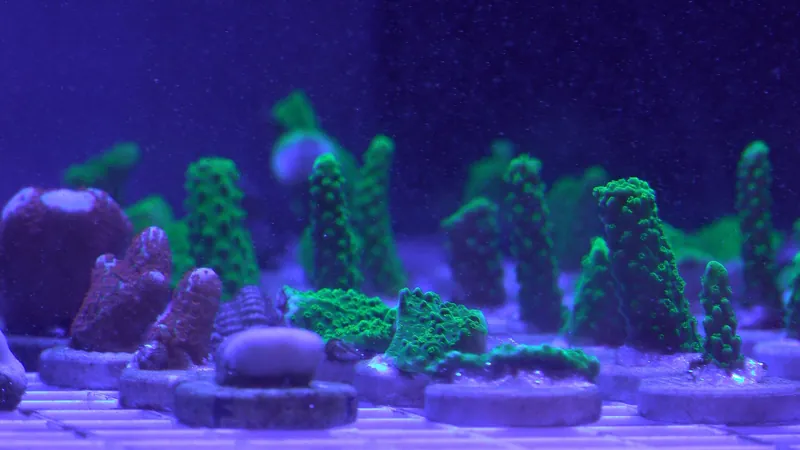
Can a Multivitamin Revolutionize Coral Reef Conservation? Early Findings Suggest It Might!
2024-11-19
Author: Nur
Introduction
In an exciting development for marine conservation, researchers from the Woods Hole Oceanographic Institution (WHOI) are exploring the remarkable potential of nutrient-rich tiles to bolster the immune systems of coral reefs. These vibrant underwater ecosystems, much like humans, thrive on essential nutrients from their environment, making this innovative approach a beacon of hope amidst the ever-increasing threats of climate change.
Research Overview
Colleen Hansel, a senior scientist and marine chemist at WHOI, articulated the essence of their groundbreaking work: "We are examining how corals respond when cultured on substrates infused with crucial trace micronutrients, such as manganese, zinc, and iron." Given the alarming rise in ocean temperatures and the wrath of powerful hurricanes, conducting field trials has been a challenge. However, preliminary data from over a year of laboratory experiments indicate that corals exposed to these "multivitamin" tiles demonstrate enhanced resistance and resilience to heat stress, a significant concern linked to coral bleaching events.
Implementation of Artificial Reef
The research team aims to implement these nutrient-infused tiles into a 20-square-meter artificial reef, meticulously designed in partnership with experts at the University of the Virgin Islands (UVI). This engineered habitat will not only create a stable foundation for juvenile corals and their larvae but also disperse vital nutrients that can enhance their ability to cope with environmental stressors.
Project Importance
Marilyn Brandt, a coral disease ecologist at UVI, highlighted the importance of this project: "The artificial reef is strategically placed next to a natural reef that has suffered extensive damage from marine heat waves and severe storms. Our goal is to protect shorelines from storm surge and erosion while simultaneously providing a sanctuary for corals troubled by the harsh realities of climate change. This is a pivotal step toward restoring the natural reef ecosystems in the area."
Cautious Optimism
While the prospects are promising, the researchers remain cautious. Field testing is crucial to ensure that the infusion of additional nutrients does not favor one particular type of coral or inadvertently encourage the growth of invasive species. Hansel and Brandt believe that a careful balance is essential for fostering a thriving aquatic environment, where diverse coral species and their associated marine life can flourish.
Ecological Diversity
"The creation of a biologically diverse and ecologically sound coral reef is paramount," emphasized Hansel. "We strive to ensure that our artificial reef mimics the sounds and structures of a natural reef, which is not solely comprised of coral but also includes vital organisms like sponges and anemones. These complex interactions are fundamental for a healthy reef ecosystem."
Conclusion
As scientists continue to explore innovative solutions for coral conservation, this research could pave the way for future interventions aimed at protecting and restoring one of our planet's most critical ecosystems. Could a simple multivitamin hold the key to saving our coral reefs? The early signs certainly suggest it might! Stay tuned as this fascinating story unfolds!


 Brasil (PT)
Brasil (PT)
 Canada (EN)
Canada (EN)
 Chile (ES)
Chile (ES)
 España (ES)
España (ES)
 France (FR)
France (FR)
 Hong Kong (EN)
Hong Kong (EN)
 Italia (IT)
Italia (IT)
 日本 (JA)
日本 (JA)
 Magyarország (HU)
Magyarország (HU)
 Norge (NO)
Norge (NO)
 Polska (PL)
Polska (PL)
 Schweiz (DE)
Schweiz (DE)
 Singapore (EN)
Singapore (EN)
 Sverige (SV)
Sverige (SV)
 Suomi (FI)
Suomi (FI)
 Türkiye (TR)
Türkiye (TR)